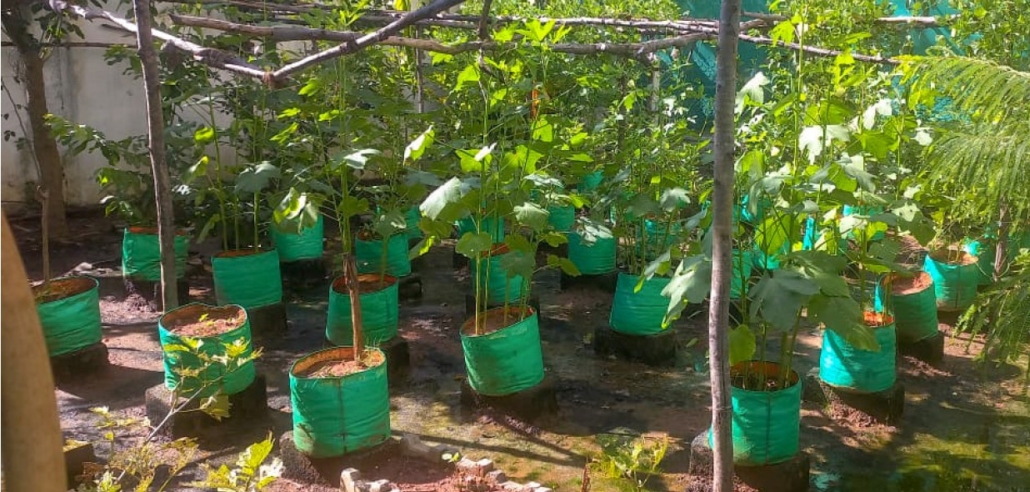The Chennai Resilience Centre (CRC), a unit of Care Earth Trust fostered by the Adrienne Arsht-Rockefeller Foundation Resilience Center, is dedicated to building an “Enlightened, Just, and Integrated Chennai” by addressing challenges posed by rapid urbanization and climate change. The organisation’s mandate is to research, develop, and implement resilience-building projects for the city, aligning with Chennai’s Resilience Strategy released in 2019.
CRC’s flagship initiative is the Chennai Urban Farming Initiative (CUFI), which has been actively transforming urban spaces, communities, and neighbourhoods since 2020 to enhance resilience against heat, food insecurity, and under/unemployment.
Key Aspects and Achievements of CUFI (2023-2024 highlights):
- Objectives CUFI aims to improve food and nutritional security for vulnerable communities, provide green livelihood opportunities through skill development, and contribute to greening and cooling the city.
- Implementation The initiative deploys Mobile Vegetable Garden Kits (MVGKs), which are modular, portable, and space-efficient. In 2023, 169 new farms were established across Chennai, including 8 model farms at homeless shelters, Integrated Child Development Services (ICDS) Centres, Resident Welfare Associations (RWAs), government-aided schools, and a resettlement colony.
- Training & Capacity Building CRC provides comprehensive in-person and online training on organic kitchen gardening, water and pest management, and composting. Since inception, 951 people have been trained. Notably, 245 women from Self-Help Groups (SHGs) under the Tamil Nadu Urban Livelihoods Mission (TNULM) were trained to become professional gardeners, known as Madras Malis.
- Impact on Food and Nutrition Model farms have yielded substantial produce (15kgs to 100kgs in six to eight months), with smaller gardens directly contributing to mid-day meals in ICDS centres, often as the only source of greens. Participants reported harvesting organic vegetables and medicinal plants, reducing market purchases, and improving nutrition for vulnerable groups, with children consuming more greens.
- Urban Cooling Findings reveal that rooms directly below rooftop gardens are 2-3°C cooler on average during sunshine hours, with a maximum difference of up to 7°C compared to exposed terraces, reinforcing CUFI’s role in heat mitigation.
- Livelihood Creation The program has generated employment opportunities for women from vulnerable communities as garden helpers, empowering them financially. Over 50 calls for Madras Malis were received between June 2023 and February 2023.
- Well-being and Sustainable Behaviour Gardening has improved mental health and emotional well-being for shelter residents. The initiative also promotes sustainable practices such as waste segregation and composting, with 780 kg of compost harvested and distributed between Oct 2023 and March 2024 through efforts like the ‘We Segregate’ project. Gardens also serve as educational tools in schools and ICDS centres, fostering active participation and learning among children and community members. CRC incentivises engagement through “Monthly Garden Champion” and “Composting Champion” competitions.
Challenges and Future Plans for CUFI: Challenges include consistent garden maintenance, pest attacks (especially rats), and the need for more soil and organic fertilisers. In response, CRC provides enhanced ‘Maintenance Kits’ and continuous support. Future plans focus on building broader societal and corporate participation, fostering self-reliance in gardens through advanced training, scaling the Madras Mali program into a social enterprise (with potential to reach 5 million women across Tamil Nadu), and leveraging scientific evidence to influence public policy for urban farming as a heat mitigation strategy. The program also aspires to extend its reach to 1,400 public day care centres and up to 100,000 women within Chennai.
Other CRC Initiatives: Beyond CUFI, CRC is involved in other significant projects:
- Water as Leverage (WaL) An initiative led by the Netherlands Government, implemented by Care Earth Trust/CRC in Chennai, focusing on innovative water management solutions. Projects include the Water Balance – NBS showcase at Little Flower Convent (treating 27,000 litres of water daily), Neithal Muttukadu (improving water management for flood-risk reduction), and the Mylapore Heritage Programme (community-based water balance model).
- The Urban Ocean Project This collaboration aims to identify and address gaps in solid waste management systems to reduce plastic leakage into water bodies. Key components include building near-zero waste neighbourhoods (e.g., in Kasturba Nagar, diverting 2699 kg wet waste and ~100 kg soft plastics from Oct 2023 to March 2024) and initiatives for clean waterscapes through trash booms in rivers.
CRC believes it is at an “inflection point,” highlighting the critical need for sustained funding and government support to fully realise the potential and scale of these transformative initiatives for a sustainable and resilient future for Chennai.



